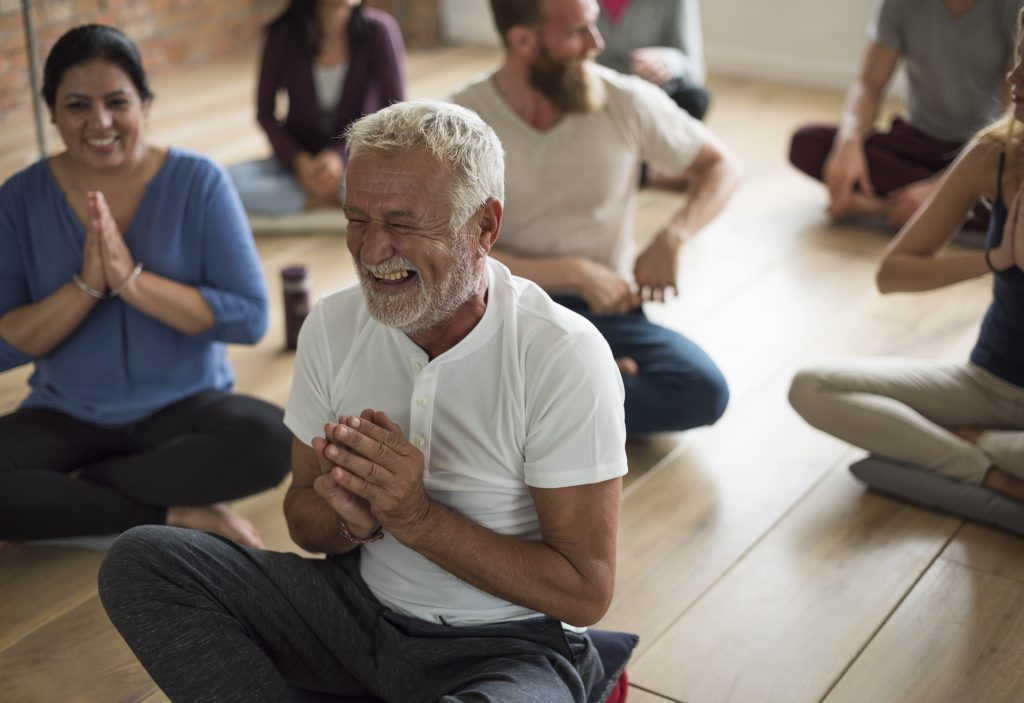The Mind-Body Connection in Senior Pain Management: A Holistic Approach through Yoga

In this article, we will delve into the profound significance of the mind-body connection in pain management among seniors. Chronic pain, commonly experienced by older adults, is not merely a physical sensation but is intricately intertwined with psychological and emotional factors. By recognizing and embracing the interplay between the mind and body, seniors can adopt a holistic approach to pain management, with a particular focus on incorporating yoga practices into their daily lives.
Understanding the Mind-Body Connection
The mind-body connection refers to the dynamic relationship between our thoughts, emotions, and physical well-being. It emphasizes that the mind and body are not separate entities but rather interconnected aspects of our being. Seniors experiencing chronic pain can benefit greatly from recognizing this connection as it provides them with valuable insights into the underlying causes and potential solutions for their discomfort.
When we acknowledge the influence of our thoughts on our physical well-being, we become more conscious of the power we have to shape our health. Positive thoughts and beliefs can foster a sense of optimism and resilience, leading to improved immune function, faster recovery from illnesses, and a general sense of vitality. On the other hand, negative thoughts and prolonged stress can weaken our immune system, contribute to the development of chronic diseases, and hinder the body’s natural healing processes.
The Influence of Psychological Factors on Pain Perception
Psychological factors, such as stress, anxiety, and depression, can significantly impact the perception and experience of pain. Seniors often encounter these challenges due to various life transitions, health conditions, or social isolation. Understanding the role of psychological factors in pain management allows seniors to address not only the physical symptoms but also the root causes contributing to their discomfort.
Exploring the Emotional Aspects of Pain
Our emotions, too, play a significant role in the mind-body connection. When we experience joy, love, and gratitude, our bodies respond by releasing endorphins, promoting a sense of well-being and relaxation. Conversely, feelings of anger, sadness, or anxiety can trigger stress responses in the body, releasing stress hormones like cortisol and adrenaline, which can have detrimental effects on our health over time.
Hence, emotions play a pivotal role in the experience of pain. Negative emotions, such as fear, anger, and sadness, can intensify pain sensations, while positive emotions have the potential to alleviate pain. Seniors need to acknowledge and express their emotions, seeking healthy coping mechanisms to manage emotional distress alongside physical pain.
The Holistic Approach of Yoga in Pain Management
Yoga, an ancient practice that combines physical postures (asanas), breath control (pranayama), and meditation (dhyana), offers a holistic approach to pain management for seniors.
Yoga has gained recognition for its therapeutic benefits in managing pain and promoting resilience. By integrating breathwork (pranayama) and meditation, yoga empowers seniors to develop a heightened awareness of their pain and cultivate a compassionate and accepting response. Through consistent practice, individuals can enhance their pain perception and build resilience to effectively navigate the challenges of chronic pain.
Breathwork, a fundamental aspect of yoga, plays a crucial role in pain management. Deep, controlled breathing techniques used in pranayama help seniors regulate their breath and activate the body’s relaxation response. This induces a state of calmness, reduces stress, and eases muscle tension, which can alleviate pain sensations. By directing their attention to the breath during yoga practice, seniors learn to shift their focus away from pain and develop a greater sense of control over their bodies.
Incorporating practices such as meditation and mindfulness further strengthens the mind-body connection. These techniques promote present-moment awareness, allowing us to observe our thoughts and emotions without judgment. Through mindfulness, we develop a deeper understanding of our bodies, identify sources of stress or discomfort, and cultivate a sense of inner calm and acceptance.
Physical Benefits of Yoga
Taking care of our physical well-being is equally crucial in maintaining a healthy mind-body connection. Engaging in regular physical activity, consuming a balanced diet, and getting adequate sleep are essential components of supporting optimal mental and physical health. Exercise, for instance, not only enhances physical fitness but also stimulates the release of endorphins, which uplift mood and reduce pain perception. By engaging in regular yoga practices, seniors can reap numerous benefits that extend beyond physical exercise.
Yoga postures gently stretch and strengthen the body, improving flexibility, balance, and joint health. Seniors often experience relief from chronic pain as yoga enhances circulation, releases muscle tension, and promotes the overall well-being of the body.
Emotional and Psychological Benefits of Yoga
Yoga provides a nurturing space for seniors to connect with their emotions, reduce stress, and cultivate a sense of inner peace. Through mindfulness practices within yoga, seniors can develop resilience, improve mood, and enhance their overall emotional well-being.
Our thoughts, emotions, and beliefs can either amplify or alleviate our discomfort. Understanding the impact of psychological factors on pain can help us develop effective strategies for pain management.
Stress, anxiety, and depression are common psychological factors that can intensify pain sensations. When we are under stress, our bodies release stress hormones that can heighten pain sensitivity and make pain feel more severe. Anxiety and fear can also amplify pain signals in the brain, making the pain experience more distressing.
Furthermore, psychological factors can contribute to the development of chronic pain. Negative emotions and unresolved emotional trauma can create a cycle of pain and distress. The pain itself can lead to feelings of frustration, anger, and sadness, which, in turn, can exacerbate the pain experience. This interplay between emotions and pain can create a vicious cycle that perpetuates and prolongs chronic pain.
On the other hand, positive psychological states can have a moderating effect on pain perception. Optimism, relaxation, and a positive mindset can help reduce the intensity of pain and improve coping mechanisms. Engaging in activities that bring joy, connecting with loved ones, and practicing self-care can all contribute to a more positive psychological state, which can positively impact pain management.

Mindfulness and Pain Perception
Mindfulness, a key aspect of yoga, involves being fully present and non-judgmentally aware of the present moment. By cultivating mindfulness during yoga practices, seniors can develop an altered relationship with pain, observing it without getting entangled in its grip. This shift in perception empowers seniors to reduce suffering and develop a greater sense of control over their pain.
Incorporating Yoga into Daily Life
To fully harness the benefits of yoga in pain management, seniors are encouraged to integrate yoga into their daily lives beyond formal practice sessions. This includes incorporating mindful breathing exercises, gentle stretches, and relaxation techniques throughout the day. Seniors can also explore specialized yoga programs designed for their specific needs, such as chair yoga or gentle yoga for seniors.
Conclusion
The mind-body connection is a vital component of pain management among seniors. By acknowledging the interconnectedness of the mind and body, seniors can adopt a holistic approach that encompasses physical, emotional, and psychological well-being. Yoga, with its focus on mindfulness and gentle movements, offers seniors a transformative tool to navigate chronic pain and improve their overall quality of life. Through the integration of yoga into their daily routines, seniors can discover the power within themselves to find relief, cultivate resilience, and embrace a life of greater well-being and joy.
